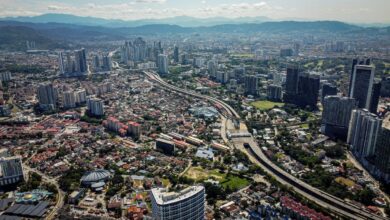Forest dwellers plead for their homes – state forces them to make an impossible choice
KUALA LANGAT: A forlorn figure walks along a barely visible track in the lush Kuala Langat North Forest Reserve.
Every few steps he pauses to point out to FMT a plant rarely seen outside the forest.
Ramlan Koyok’s depth of forest knowledge is not surprising as he is a Temuan and grew up here like all of his tribe.
He has a connection to the forest. It is where he finds food and medicine. His whole life and identity have been shaped by it.
However, it is now vanishing before his eyes.
Ramlan is one of under 1,000 Orang Asli from three villages affected by the degazetting plan for a large part of their forest reserve.

The destruction of the jungle has already begun, to make way for a development project which will leave only a small area intact for his remote community.
As he guides FMT deeper into the forest, he reminisces about growing up here, saying how he and his friends used to pick and eat food straight from the trees but even that is changing.
“I remember there was a bigger variety of fruit here when I was a child,” he says.
He explains how the development project, although still in its early stages, has already had an effect on the flow of water in the forest, damaging its ecosystem.
“There used to be a lot of fish here. Now, there are hardly any left,” he says, pointing to a small, almost dried-out water catchment area.

Another villager, a 55-year-old elder known as Rata, also tells FMT of her struggles due to the degazetting plan.
She depends on the forest to support her family of seven by making and selling mengkuang handicrafts.
Weaving mengkuang leaves is a traditional tribal craft and Rata is one of many tribal women in forest kampungs who search out the plants to turn the leaves into baskets and other artifacts to sell.

The development project is already creating a scarcity of the plants.
“Usually, I can get RM200 to RM300 a month by selling my weavings. It is not much, but at least I get something,” says Rata.
But now that it’s becoming more difficult to find the plants, she is worried she will have to find another way to make money.
“I am too old, there’s not much I can do anymore,” she says.
With their forest and homes under threat, many Temuan folk decided to stand up and be counted in order to protect what rightfully belongs to them.
Through a series of peaceful demonstrations and written submissions, they urged the state government to come up with an equitable solution.
However, the solution arrived at by the state government was not what they had wished for and certainly not equitable.

Temuan Tok Batin Ros Gudang said the state government has given them a choice: they can save either the forest or their villages.
“How can you ask us to choose which one we love and care for more,” he says, struggling to hold back tears.
To ensure their survival, the Temuan decided to save their villages: Kampung Pulau Kempas, Kampung Busut Baru and Kampung Bukit Cheeding.
“Our villages have not been gazetted yet. If we don’t prioritise them, one day we will be forced to relocate,” Ros explains.
The state government has promised to gazette all three villages, but the marginalised community still described the outcome as a “losing battle”.
Ros explains they have made this decision to secure the inheritance of farm plots, orchards, and ancestral graveyards, for future generations.
He looks bleak as he tells FMT, “We need to make sure the younger generation has a place to call home”.






You must be logged in to post a comment.